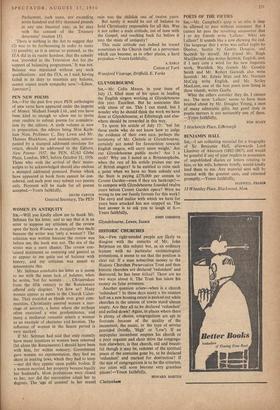WOMEN IN ANTIQUITY
.SIR, Will you kindly allow me to thank Mr. Seltman for his letter, and to say that it is an error to suppose my• criticism of the review upon the book Women in Antiquity was made because the writer was 'only a woman'? The criticism was written because the review was before me, the book was not. The sex of the writer was a mere chance. The review con- tained statements so sweeping and general as to appear to me quite out of balance with history, and my criticism was meant to demonstrate this.
Mr. Seltman concludes his letter as it seems to me with the same lack of balance, when he writes, 'but for women . . . Christendom from the fifth century to the Renaissance offered only disgrace.' Yet how so? Many women appear as saints in the Church Calen- dar. They presided as Heads over great ,com- munities, Christianity assured women a mar- riage of security, a home where she perhaps often exercised a wise predominance, and many a medieval romance selects a woman as an example of character and heroism. The influence of women in the Saxon period is very marked.
If Mr. Seltman had said that only recently have many injustices to women been removed (let alone the Renaissance) I should have been with him, for within memory, Government gave women no representation, they had no share in making laws, which they had to keep —nor did they appear upon public bodies. If a woman married, her property became legally her husband's. Most professions were closed to her, nor did the universities admit her to degrees. The 'age of consent' to her sexual But surely it would be out of balance to hold Christianity responsible for all this. Was it not rather a male attitude, out of tune with the Gospel, and reaching back far before it into the mists of antiquity?
This male attitude can indeed be traced sometimes in the Church itself as a perversion which can become, as in other places, a hard prejudice.—Yours faithfully,
A. EARLE Canon of York Wansford Vicarage, Driffield, E. Yorks


































 Previous page
Previous page